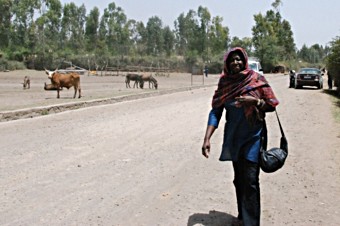Hope for a future free of meningitis in Ghana

Mercy Ahun
Managing Director, Programme Delivery, GAVI Alliance
Mercy reflects on her time working with patients in Ghana suffering from the effects of meningococcal meningitis A, Ghana’s most common form of meningitis.

Growing up in a Ghanaian coastal village, the dry and dusty trade winds that blew in from the Sahara were associated with Advent, Christmas, and happiness.
But as I moved inland with my work, they also became linked with meningococcal meningitis A, Ghana’s most common form of meningitis, which brought major epidemics every 8 to 12 years.
Meningitis A strikes children and young adults suddenly, causing severe headaches, fever, and a stiff neck. Patients can die within 48 hours.
I still remember the hospital wards, where I used to work. Meningitis patients were usually on the floor because their seizures made them fall off the bed. As a medical student, I often had to bend the rigid patients into a foetal position so that I could extract the cloudy fluid from their spinal cord and confirm the suspected diagnosis. Year after year, we gave intravenous antibiotics every four hours and prayed the patient would survive without major complications.
MenAfriVac, a new vaccine against Meningococcal Meningitis seroptype Nm A, is expected to prevent meningitis epidemics in Africa's "meningitis belt" of 25 countries that stretch from Senegal in the west to Ethiopia in the east.
Source: Youngblood/GAVI/2010
In 1989, I became the district medical officer responsible for preventive health of a city of one million people. On one memorable occasion, with an epidemic threatening, a terrified crowd of people nearly broke down the vaccine cold store door in an attempt to get the vaccine. The fear on their faces was palpable.
Then, in 1997, the biggest ever meningitis A epidemic struck, not just in the four northern regions as usual - but throughout the country - hitting about 20,000 people.
And just a few years later, in 2001, a close relative of mine - a healthy 20 year old - began complaining of a headache. He later collapsed and was given intravenous antibiotics. Within 48 hours he was dead.
His death devastated my family, with rumours amok about the role of evil spirits. A decade later, my extended African family is still coming to terms with the loss.
I’m proud to say the GAVI Alliance has just committed another US$100 million to support the roll-out of a new conjugate vaccine, MenAfriVac™, to rid the region of these meningitis A epidemics. If our pledging conference is successful on 13 June, GAVI will be able to roll this vaccine out to all African countries at risk.
This Christmas, I am taking my children back to Ghana. The new MenAfriVac™ vaccine gives us the opportunity to celebrate without fear of this ancient scourge. It provides us hope for the future.
